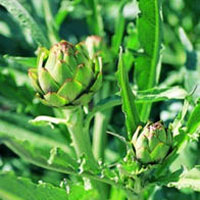Gluten Free
What does following a gluten-free diet mean? That you're embarking on an easy diet with a wide range of health-promoting effects. Instead of dwelling on what you’re giving up, consider that you’re going to enjoy a whole new world of delicious food options to meet your special dietary needs. You’ll be eating seasonally, choosing more fresh fruits and vegetables, focusing on meats, seafood, poultry, legumes, lentils, corn, and rice, and discovering fascinating ancient grains such as quinoa, amaranth, and millet. You’ll be able to eat potatoes, eggs, most cheeses, even chocolate (!)—and enjoy them without guilt because you’ll be taking good care of your body. In fact, you’ll probably end up eating—and feeling—better than ever!
Visit this page for more information about living Gluten Free
---
We carry a large variety of gluten free items, the brands listed below represent just some of the offerings we carry















More Diets
Artichoke
 © Martin Wall
© Martin WallParts Used & Where Grown
This large thistle-like plant is native to the regions of southern Europe, North Africa, and the Canary Islands. The leaves of the plant are used medicinally. However, the roots and the immature flower heads may also contain beneficial compounds.1
- Reliable and relatively consistent scientific data showing a substantial health benefit.
- Contradictory, insufficient, or preliminary studies suggesting a health benefit or minimal health benefit.
- For an herb, supported by traditional use but minimal or no scientific evidence. For a supplement, little scientific support.
Our proprietary “Star-Rating” system was developed to help you easily understand the amount of scientific support behind each supplement in relation to a specific health condition. While there is no way to predict whether a vitamin, mineral, or herb will successfully treat or prevent associated health conditions, our unique ratings tell you how well these supplements are understood by the medical community, and whether studies have found them to be effective for other people.
For over a decade, our team has combed through thousands of research articles published in reputable journals. To help you make educated decisions, and to better understand controversial or confusing supplements, our medical experts have digested the science into these three easy-to-follow ratings. We hope this provides you with a helpful resource to make informed decisions towards your health and well-being.
This supplement has been used in connection with the following health conditions:
| Used for | Amount | Why |
|---|---|---|
High Cholesterol | 500–1,000 mg daily | Artichoke leaf extract has been found to lower total and LDL-cholesterol levels and may increase HDL-cholesterol levels. |
Indigestion, Heartburn, and Low Stomach Acidity | 500 to 1,000 mg cynarin in a standardized herbal extract three times per day | Extracts of artichoke have been repeatedly shown in research to be beneficial for people with indigestion. |
Irritable Bowel Syndrome | Refer to label instructions | In a preliminary study of people with irritable bowel syndrome who took an artichoke leaf extract daily for two months, 26% reported an improvement in symptoms. |
Traditional Use (May Not Be Supported by Scientific Studies)
The artichoke is one of the world’s oldest medicinal plants. The ancient Egyptians placed great value on the plant—it is clearly seen in drawings involving fertility and sacrifice. Moreover, this plant was used by the ancient Greeks and Romans as a digestive aid. In 16th century Europe, the artichoke was favored as a food by royalty.2
Copyright © 2025 TraceGains, Inc. All rights reserved.
Learn more about TraceGains, the company.
The information presented by TraceGains is for informational purposes only. It is based on scientific studies (human, animal, or in vitro), clinical experience, or traditional usage as cited in each article. The results reported may not necessarily occur in all individuals. Self-treatment is not recommended for life-threatening conditions that require medical treatment under a doctor's care. For many of the conditions discussed, treatment with prescription or over the counter medication is also available. Consult your doctor, practitioner, and/or pharmacist for any health problem and before using any supplements or before making any changes in prescribed medications. Information expires December 2025.











